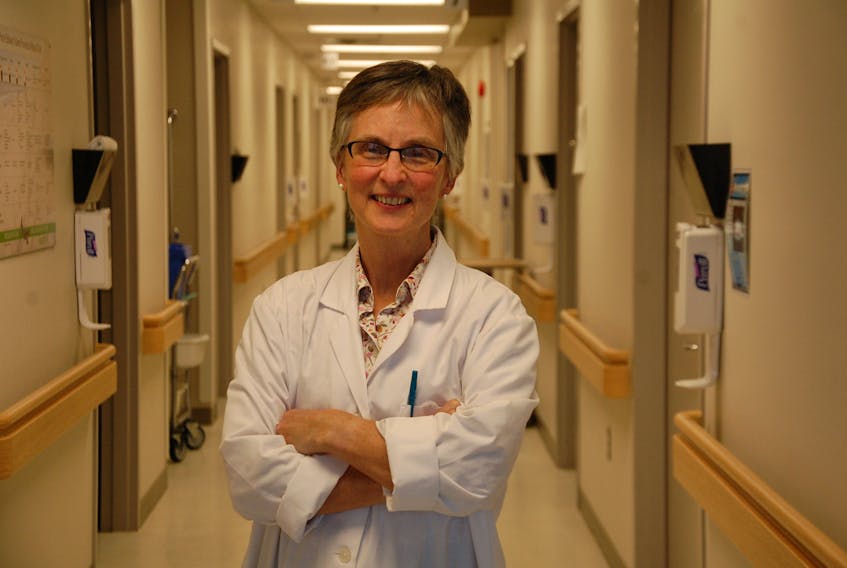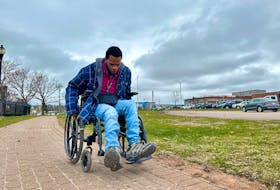Kathy Mutch of Stratford is back from visiting hundreds of her “neighbours” who just happen to live more than 10,000 kilometres away from Prince Edward Island.

Mutch recently led a three-week trip to Mageta Island to help this impoverished area in southwestern Kenya build sustainable, healthy communities through improvements in water, sanitation, hygiene, agriculture, nutrition and education.
She considers it a fair question to be asked why she chooses to put her volunteer efforts into helping people in a far-away country when many nearby Islanders are in need of assistance.
She has a thoughtful – and thought provoking - response.
“There’s lots of work to be done everywhere,’’ she notes.
“I think globally. I don’t think just locally. So, in my mind Kenya is a neighbour. They are part of our global community. There’s so much to be done everywhere. Everybody just take a piece. And right now, that’s my piece.’’
Mutch says she long held the desire to help people in underdeveloped countries where poverty is an underlying factor in their health-care needs.
Her caring disposition and professional skills as a nurse have made her a valuable volunteer since becoming involved, in 2010, with Mikinduri Children of Hope (MCOH). The P.E.I.-based group formed in 2003 with a goal of relieving the effects of poverty in Kenya by working with local leaders, churches, government agencies, self-help groups and international partners.
Mutch has made three trips to Mikinduri to volunteer with medical camps.
“I was the triage nurse, sort of the one that figured out what was going on and moved patients through,’’ she explains.
“During that time, I really felt strongly that one of the pieces that we were missing from what we were doing was getting to the basics of why people are having problems in the first place.’’
Ted Grant, co-founder and president of MCOH, lauds Mutch’s ability to find practical and sustainable solutions to many issues from hygiene to education.
Her problem solving, he adds, is fueled by a deep desire to help disadvantaged people.
“She has a passion for helping women and children…she is very thorough in her approach to everything she does,’’ says Grant, adding that the group is fortunate to have her leading the community-based health-care committee.
Mutch says she knew by the age of four that she wanted a career in nursing. The goal never wavered.
She simply yearned to help people, a selfless attribute that has driven her success not only in nursing but in volunteering with Mikinduri Children of Hope.
She is an enterostomal therapy nurse at the Queen Elizabeth Hospital – that’s a registered nurse with advanced and specialized knowledge and clinical skills in wound, ostomy and continence care.
Mutch, who works a good deal with people who have chronic diseases, has grown over time to understand how difficult it is for people to make a change in lifestyle and habits.
“And I’ve learned how important it is to partner with patients,’’ she adds.
“So, I use the same approach in Mikinduri or wherever I go, and that’s where the real benefit comes because you connect with people. You develop a passion for what they are doing to make their lives better there.’’
Emotional work
Kathy Mutch recalls a moving encounter in Mikinduri when approached by a woman carrying a gorgeous little child who was close to two years old. The woman, who due to poor health felt unable to continue to care for her child, asked Mutch if she would take her.
“I just basically burst out in tears,’’ says Mutch.
Fortunately, Mutch was able to line the woman up with an NGO that looks after families to provide medication the woman needed to deal with her diabetes.
"... In my mind Kenya is a neighbour. They are part of our global community. There’s so much to be done everywhere. Everybody just take a piece. And right now, that’s my piece.’’
Mutch is both determined and realistic in just how much and how quickly improvements can be made to a place like Mageta Island, which is located in one of the poorest districts in Kenya.
Most inhabitants follow traditional practices which include wife inheritance, early marriages among girls leading to drop-outs from school and risky sexual behaviours, such as women and even girls trading sex for fish, leading to sexually transmitted diseases in a place where the HIV rate is extremely high.
Mutch earlier this year led a team of five to Mageta Island, including fellow Islander Brittany Garrett of Charlottetown and three others from Toronto, on a trip dubbed Partnering for Change.
Change, she is quick to note, does not come easily.
Getting people to stop the long-held practice of open defecation and move towards toileting, for instance, is a challenging work in progress.
“Change takes time,’’ says Mutch.
And she has plenty of time for the work of Mikinduri Children of Hope and for the people of Kenya.
She sees the need for a 10-year commitment to help bring positive, sustainable change to Mageta Island.
The 63-year-old Mutch, who plans to retire from nursing in a couple of years, is determined to remain heavily involved with MCOH for at least another decade.
“The people there really steal your heart,’’ she says.
“They have so little, and yet they are working so hard for their kids.’’
Mutch is proud of the impact she has seen made by Mikinduri Children of Hope.
She notes the group’s recipe for success comes both in careful monitoring as well as leaning on a collaborative approach that includes meeting with – and engaging –- the communities they wish to assist.
“I think it comes back to sense of community and neighbourhood and my vision that we are all part of the same community,’’ says Mutch.
“I think we have a very big responsibility because we are blessed with so much here, that we need to feel comfortable with sharing that.’’










